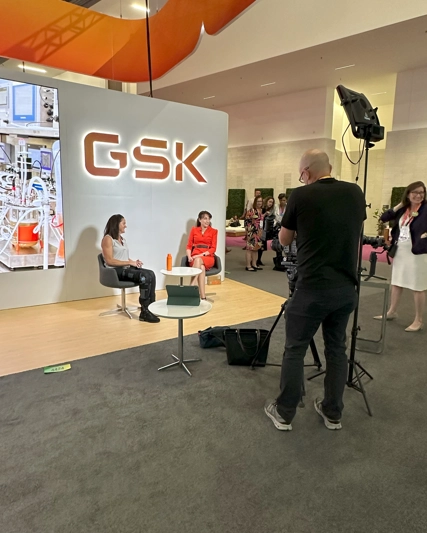GSK ranks 1st in the 2021 Access to Medicine Index with leading R&D pipeline for priority diseases
For media and investors only
Issued: London, UK
- Ranking reflects GSK leadership through access to its medicines and vaccines for people around the world
- Company extends albendazole donations with WHO for control of soil-transmitted helminthiasis in school-aged children to 2025, adding to existing commitment to elimination of lymphatic filariasis
The Access to Medicine Index (ATMI) published its 2021 report today, with GSK again ranking 1st among 20 of the world’s largest pharmaceutical companies. The independently developed, investor-backed Index is based on progress companies are making in improving access to medicine in 106 low- and middle-income countries and in relation to 82 diseases, conditions and pathogens.
GSK’s overall ATMI score improved from the 2018 Report, reflecting the company’s clear access-to-medicine strategy embedded within overall company strategy, and the application of its scientific innovation to address global health priorities - with the largest R&D pipeline compared to peers targeting priority diseases impacting people in low- and middle- income countries.
The report also further highlights the significance of cross-industry and cross-sector collaboration in improving the health of people in developing countries. A number of collaborations aligned to GSKs Global Health priority areas were recognised, including the development of paediatric formulations of dolutegravir for HIV; licencing its tuberculosis vaccine candidate to the Gates MRI for development and use in low-income countries; and collaboration with WHO, PATH and Ministries of Health to implement the RTS,S vaccine for malaria in Ghana, Kenya, and Malawi. The Index also recognises the breadth of ViiV Healthcare’s voluntary licensing for dolutegravir and the impact of GSK’s work with GAVI.
Emma Walmsley, Chief Executive Officer, GSK, said: “We are delighted to top the Access to Medicine Index once again and that our innovation in priority diseases affecting global health has been recognised. Our position reflects the outstanding contributions of our people, who work in labs and manufacturing sites across GSK, to bring medicines and vaccines to people around the world. This would also not be achieved without the help of our many partners and I would like to thank and recognise all those we work with in global health. Looking ahead, we remain strongly committed to improving research, access and development of new medicines and vaccines for global health diseases, in particular HIV, TB and malaria, future pandemics and antimicrobial resistance.”
Jayasree K. Iyer, Executive Director of the Access to Medicine Foundation: “Too many people lack access to innovative medicines and vaccines emerging from R&D pipelines. We are seeing a strategic shift to systematic access planning by pharma companies that could radically change how access to medicine is achieved – as long as it translates into action at scale for all new products.”
The Index specifically references the impact of GSKs donation of albendazole, in partnership with the WHO, as part of efforts to control soil-transmitted helminthiasis (STH- intestinal worms) in school-aged children. GSK today announces that it is extending this donations programme to 2025.
Since 1999, GSK has donated 10 billion tablets of albendazole as part of its commitment to working with partners to eliminate and control two neglected tropical diseases. One albendazole tablet can address both lymphatic filariasis (LF), and STH. To date, we have reached 923m people in 92 countries, contributing to the elimination of LF in 17 countries. Further to the extension of the donations to combat STH in school age children through to 2025 announced today, GSK has committed to continue albendazole donations for LF until it has been eliminated as a public health problem worldwide.
About the Access to Medicine Index
The 2021 Access to Medicine Index is an independent ranking of 20 of the world’s largest pharmaceutical companies, based on the steps they take to improve access to medicine. It assesses their actions in 106 low- and middle-income countries and in relation to 82 diseases, conditions and pathogens. The Index is endorsed by more than 100 institutional investors, collectively managing assets worth more than USD 17 trillion.
The Index is based on a framework of 33 indicators that together capture the core role for pharmaceutical companies to improve access to medicine, as confirmed through a wide-ranging multi-stakeholder dialogue. The Index is independently developed and published by the Access to Medicine Foundation, a non-profit organisation based in the Netherlands.
About GSK
GSK is a science-led global healthcare company with a special purpose: to help people do more, feel better, live longer. For further information please visit www.gsk.com/about-us.
Cautionary statement regarding forward-looking statements
GSK cautions investors that any forward-looking statements or projections made by GSK, including those made in this announcement, are subject to risks and uncertainties that may cause actual results to differ materially from those projected. Such factors include, but are not limited to, those described under Item 3.D "Risk Factors" in the company's Annual Report on Form 20-F for 2019 and as set out in GSK’s “Principal risks and uncertainties” section of the Q3 Results and any impacts of the COVID-19 pandemic.


